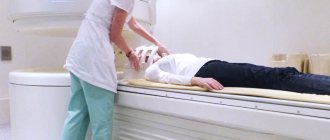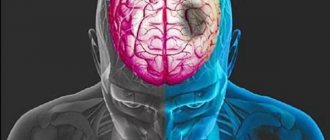Home>Articles> Alcoholic Korsakov psychosis: causes and consequences
quick menu (hide)
- History of Korsakov's psychosis
- Differences between the disease and others
- Causes of psychosis
- Signs and symptoms of Korsakov's psychosis
- Diagnosis of mental disorder
- Treatment of Korsakoff psychosis in alcoholism
- Prevention of Korsakov's psychosis
Alcoholism has become a rather serious problem of our time. Statistics show that the majority of people whose death occurred from external factors were under the influence of alcohol. In addition to the fact that it has a detrimental effect on physical health, excessive consumption can also lead to mental disorders. One of these is Korsakov psychosis.
Picture the picture. An intoxicated man, about 60 years old, is admitted to the hospital and is easily communicative, but what he states sounds quite strange. He is confused, does not understand how he got here and what they want from him, he cannot stay straight on his feet. He doesn’t refuse medical help, but he can’t explain much. Soon after hospitalization , it became clear that the old man did not remember the faces and names of the doctors or the location of his room at all. But he could talk with admiration and in detail about how yesterday he took part in the battle, and thanks to him the army won.
note
The disease that the article will be about is important for many medical fields - neurology, neuropathology, psychology, etc.
General information about Korsakoff psychosis
Psychosis should not be confused with Korsakoff's syndrome. In the first case, the disease implies an alcoholic etiology (origin), while the development of the syndrome can be caused by other reasons not related to abuse , for example: traumatic brain injury, infection, hypoxia, tumors, various dementias.
Alcoholic Korsakov psychosis, as a mental disorder caused by prolonged exposure to alcohol on the human brain with mnestic disorders, as well as positive and negative symptoms, was first described by the Russian psychiatrist S. S. Korsakov in 1887. The disease occurs in a chronic form, observed in approximately 5% of those suffering from alcoholism. As a rule, it affects elderly people, less often middle-aged people. In most cases, the disease is accompanied by other pathologies caused by prolonged alcohol consumption (liver cirrhosis, cardiovascular diseases, dysfunction of the digestive system).
Diagnosis of mental disorder
Diagnosing Korsakoff psychosis is quite simple, judging by the symptoms. It is better to examine such patients and discuss treatment tactics in the presence of relatives. When making a diagnosis, it is very important to exclude other causes of the disease. If the disease did not occur through alcohol addiction, then the treatment will be different.
To make a diagnosis, first of all, the patient must be completely examined, blood taken, and in addition to general tests, the thiamine level must be examined. It is also necessary to check the functioning of the liver (do an enzyme test), possible disturbances in coordination during movement, and the correct functioning of the brain. Specialists are required to conduct tests that can help determine memory disorders and the ability to process information, as well as determine the level of memorization of new information. Tests are carried out on the oldest area of the brain - the limbic system. It is responsible for converting short-term memory into long-term memory. If during the tests damage to at least one part of the system was detected, then a diagnosis can be made.
Often, patients do not realize their disorder and, accordingly, do not seek help themselves. Therefore, it is very important to do all the necessary examinations and study the clinical picture in detail in order to prescribe the most effective treatment.
Causes of development of Korsakoff psychosis
The development of the disease occurs over a long period of time - 10–20 years. Symptoms of the chronic disorder often appear after an exacerbation of the psychosis that results from alcoholic encephalopathy. Also, the manifestation of characteristic symptoms can provoke complex delirium. Much less often, pathology develops in conditions of relative well-being in mental terms, without preliminary phenomena of a psychotic nature. Many sources cite the presence of somatic pathologies (especially the digestive system and liver) or traumatic injuries as provoking factors.
Material and methods
An analysis of case histories and intravital neuroimaging results was carried out for 23 patients, 9 men and 14 women aged 23-74 years (average - 49.5±2.3 years), who were treated in the neurological department of the Moscow Regional Research Clinical Institute named after. M.F. Vladimirsky in 2011-2015.
In the cases studied, an acute development of a characteristic triad of symptoms was noted: changes in consciousness, oculomotor disorders, and cerebellar ataxia.
Subsequently, patients who were diagnosed with acute cerebrovascular accident (8 patients), exacerbation of multiple sclerosis (5 patients), encephalitis caused by the Herpes
simplex
virus (1 patient), acute disseminated encephalomyelitis (2 patients) were excluded from further study.
The study included 8 patients, 5 men and 3 women aged from 23 to 56 years (mean age 38.9±1.4 years), in whom the diagnosis was established based on clinical data from the results of neuropsychological and neuroimaging (CT and MRI) examinations SVK.
All patients underwent an examination, which included a therapeutic and neurological examination, and a study of clinical and biochemical blood parameters. Neuroimaging studies were performed on a Somatom Emotion 16 spiral X-ray computed tomograph (4 patients), an Initial Achieva 3.0T magnetic resonance tomograph (Philips Medical System Nederland BV, the Netherlands) with a magnetic field strength of 3.0 T (2 patients).
Pathogenesis
There is an opinion that Korsakov's psychosis in alcoholism develops due to acute acquired deficiency of nicotinic acid and thiamine. A deficiency of biologically active substances occurs due to poor nutrition and disruption of the digestive system. Ethyl alcohol has a stimulating effect on the functioning of the small intestine, which plays a leading role in the process of digesting food and absorbing substances necessary for the normal functioning of the body. Due to the high speed of chyme movement, the small intestine is not able to properly absorb the required amount of vitamins. Atrophy of the intestinal mucosa, a characteristic result of prolonged exposure to alcohol, also a negative The lack of biologically active components leads to gradual degradation of limbic structures. Histological studies reveal massive death of the nerve tissue of the brain, which is also accompanied by the destruction of the nervous tissue of the spinal cord.
Causes of central nervous system damage in alcoholics
The main cause of central nervous system damage in alcoholics is a violation of neurometabolism - metabolic processes in the central nervous system. These violations are usually caused by the following factors.
- As you know, alcoholics usually eat little and poorly - the diet is disrupted, and the food the body receives quickly ceases to be absorbed. The nervous structures of the body are faced with a deficiency of substances necessary for their normal functioning.
- Nervous tissue also faces a deficiency of substances – primarily, a deficiency of gamma-aminobutyric acid (GABA) and aspartate.
- Glutomate obtained with alcohol has an excitotoxic effect, quickly leading to damage and subsequent death of nerve cells. As a result, multiple sclerosis develops, as well as symptoms of Alzheimer's, Parkinson's and Huntington's diseases and other central nervous system diseases.
There are other factors, and there are many of them. In particular, ethanol itself damages nervous tissue, and some of its metabolites even kill it immediately. The influence of low-quality alcohol - cheap or surrogate vodka - is especially destructive. The effect of alcohol on the liver, as well as on many other functions of the body, is also significant.
Symptoms of Korsakov's psychosis
The first symptoms of Korsakoff psychosis appear long before the development of signs of a full clinical picture of the disease. Within 1–2 years before the formation of pathology, patients complain of aches, sensory disturbances and nagging pain in the lower extremities. The gait becomes unsteady. Problems become especially obvious a day after drinking alcohol. mental begin to appear - decreased quality of sleep, decreased sphere of interests, anxiety without an objective reason, fears.
At the next stage, as a rule, during the next binge or after the onset of a somatic illness, delirium begins, which results in the formation of a classic clinical picture of Korsakov's psychosis. Deterioration of the psyche without hallucinations and clouding of consciousness is possible, but such a development of the disease is observed quite rarely. Classic signs of pathology:
- severe form of amnesia;
- false memories;
- loss of orientation;
- polyneuritis of the legs.
Patients are most often aware of the presence of mental defects, so they try to hide them. They avoid direct answers when it comes to their well-being and try to steer the conversation in a different direction. Gaps in memory are replaced by fantasies, assumptions , passed off as events that actually happened. Facts get mixed up and lose their objective connection to place and time.
Other signs of Korsakov's psychosis are observed, for example, the manifestation of affective disorders - lethargy, passivity, or, conversely, causeless fussiness. There may also be manifestations of carelessness, bravado, inappropriate complacency or unreasonable anxiety accompanied by confusion. Deviations in the functioning of the nervous system become noticeable.
The disease occurs in one of two forms - regressive or stationary. In the first case, the manifestation of amnesia decreases, the volume of memories increases, including about past events. The stationary form is characterized by persistence of memory dysfunction.
Characteristics of psychosis, risk group
Alcoholic polyneuritis psychosis is a severe impairment of short-term and long-term memory and speech, aggravated by polyneuritis. The pathology was first described by the Soviet psychiatrist S.S. Korsakov in 1887.
During psychosis, paraphasia develops - problems with constructing words and sentences. Analyzing the memory processes of patients with polyneuric psychosis, it was revealed that short-term memorization does not transform into long-term memory. Polyneuritis is a lesion of the peripheral nervous system. Its symptoms:
- muscle weakness;
- paresis - impaired muscle strength;
- loss of sensitivity in hands and feet;
- impairment of motor activity.
Patients have a decreased physiological tone. The initial symptoms are the so-called “goosebumps” running through the body.
The average age of diagnosis is 50-55 years. The gender of patients is predominantly female. Pathology is most often formed on the basis of stage 3 alcohol dependence. At risk are older people who use ethanol substitutes - colognes, alcohol-based medications.
A mental disorder affects nerve tissue. Patients experience confabulations—false memories. Retrograde or fixation amnesia and disorientation in time and space occur periodically.
Diagnosis of Korsakov's alcoholic psychosis
For specialists, identifying Korsakov's alcoholic polyneuritic psychosis is not difficult. The presence of pathology is obvious. The diagnostic procedure includes:
- Examination by a psychiatrist. The nature of amnesia, its severity, the degree of loss of orientation, the presence of hallucinations, and delusions are clarified. A significant role is played by the patient’s relatives and friends, who are able to provide truthful information about the patient’s behavior in everyday life, the duration of alcohol consumption, the presence of preliminary symptoms and triggering factors of the disease.
- Examination by a neurologist. The presence and degree of development of polyneuritis is revealed. The doctor also pays attention to muscle atrophy, paresis of the limbs, function of the eye muscles, identifies the presence of an unsteady gait, and a violation of the coordinated functioning of the muscles.
- Examination by specialists of various profiles. There is often a need to seek advice from a cardiologist, gastroenterologist and other highly specialized doctors to clarify the presence and degree of development of somatic disorders.
- Laboratory research. It is necessary to undergo hardware examinations - EEG, MRI of the brain and abdominal cavity, computed tomography (CT) of internal organs. A detailed biochemical blood test is also required.
It is necessary to carry out differential diagnosis. Some symptoms of the disease are also characteristic of: Korsakoff's syndrome, atherosclerosis, progressive paralysis.
Symptoms of Korsakov's syndrome
Recognizing the disease is not difficult if you pay attention to the symptoms of Korsakoff syndrome. Memory impairment, disorientation in space and time, inability to recognize family and friends - this is not the whole picture. Symptoms also include:
- dysphoria;
- attacks of anger, irritability;
- mood swings;
- anxiety, excessive worry;
- panic attacks;
- impaired concentration in actions and conversations.
With Korsakoff syndrome, the body is severely depleted, strength dries up, and weakness accompanies it. At the same time, the alcoholic categorically denies his addiction and the resulting mental disorders. But without the help of a qualified doctor and the support of loved ones, it is impossible to recover.
As described earlier, confabulation is possible, in which the patient replaces events with false ones. And one cannot say that he is composing; in fact, it could have seemed, been imagined, or dreamed of.
What is especially dangerous is that in advanced cases, one syndrome can overlap another. Such dynamics lead to deterioration of treatment, but experts note cases in which cognitive, motivational, affective, motor, etc. were restored.
Treatment of Korsakov's psychosis
If Korsakoff psychosis is clearly diagnosed, treatment will be comprehensive, aimed at localizing the damage and restoring various body functions. The acute course of the disease requires keeping the patient in a hospital setting. Treatment is carried out by psychiatrists, narcologists, neurologists and other specialized specialists. List of therapeutic measures:
- Eliminating the possibility of drinking alcohol. An obligatory and main component of treatment. Already at this stage, restoration of some functions is observed, and the risk of further deterioration of the condition is significantly reduced.
- Detoxification. It starts from the first days of therapy. Includes infusion of saline solutions, administration of glucose, and the use of other drugs.
- Vitamin therapy. It consists of saturating the body with B vitamins. This is an effective method of treating polyneuritis, eliminating or significantly reducing the manifestation of neurological disorders.
- General care and supervision. Necessary for serious problems with orientation, passivity, and severe forms of amnesia. The medical staff monitors the implementation of hygiene procedures, compliance with the regime, and physical activity. Bedridden patients require special care to resist the development of pressure ulcers and hypoventilation pneumonia.
- Physiotherapy. Massage, hardware, gymnastics to prevent complications of diseases of internal organs, alleviate polyneuritis, stop muscle atrophy.
After the exacerbation has resolved, further observation is possible in a hospital setting or at home, if relatives and friends guarantee compliance with doctors’ orders.
Causes
The formation of psychosis occurs slowly, over 8-15 years. The pathology becomes chronic after several exacerbations.
The causes of the disease have been determined - it occurs against the background of a lack of thiamine in skeletal muscles and a deficiency of nicotinic acid. The development mechanism is as follows: long-term binges provoke B1 deficiency in the body, its absorption is impaired, and Wernicke encephalopathy develops. There is bilateral damage to the limbic structures - these are areas of the brain that are ancient in evolutionary development.
The central antecedent factor is advanced alcohol dependence. Among the causes are also cerebral hypoxia, vitamin B deficiency, poor diet, and infections.
The disease often develops against the background of Wernicke encephalopathy. In the case of alcohol dependence, symptoms of psychosis appear during withdrawal symptoms.
Detoxification
3 000 ₽
Calling a narcologist to your home
3 000 ₽
Symptoms of Korsakoff psychosis
The first manifestations are observed long before the formation of a full-fledged clinical picture of psychosis. Before the onset of the pathology, for a year or two, patients have general weakness, body aches, problems with sensitivity, and periodic pain in the arms and legs. The style of a person’s gait changes—it becomes “loose.”
Mental symptoms arise - problems with sleep, a narrowing of the circle of entertainment, increased anxiety, and confusion that was not typical before. At this stage, patients often do not notice defects or try not to talk about them or pay attention to them.
In the first stages of polyneuric psychosis, alcoholic delirium is observed - impaired consciousness, visual and auditory hallucinatory phenomena. Orientation in space is lost. Previous skills and abilities are forgotten.
Among the clinical manifestations, retrograde amnesia is primarily noted. This is a severe memory disorder - a person forgets events that happened before the attack. Anterograde amnesia is also present - facts and events that occurred after the onset of psychosis are forgotten. Long-ago events are remembered more. Other symptoms:
- disorientation in time;
- emotional disturbances - apathy, lethargy, fatigue;
- causeless mild euphoria;
- feeling of “ache” throughout the body;
- pain syndrome in the limbs;
- darkening, “sparks” in the eyes;
- headache, attacks of severe dizziness;
- at night - convulsive episodes in the calf area.
Additionally, motivational and affective symptoms arise. A person becomes uninitiated, often feels tired, and loses his previous interests and hobbies. Facial expressions and motor skills are impoverished and slowed down. There is periodic irritation, a state of anxiety with hypochondriacal fears.
Symptoms are more pronounced in patients with kidney pathologies. Colitis also provokes the rapid development of disorders.
In the last stages of psychosis, a person is unable to perform everyday activities, he cannot engage in self-care. Fixation amnesia is formed - events and facts that happened a few minutes or hours ago are forgotten.
Paramnesia of various types develops - in the patient’s consciousness there are memory gaps that are filled with information from the past or from films watched. Your own life begins to seem like a chapter of a book or an episode of a TV series - this is cryptomnesia. A person is unable to remember when this or that event occurred in his life. Often pseudo-reminiscence is formed - events that happened in life are mixed up in time intervals.
Diagnosis and treatment
Only a comprehensive diagnosis and professional approach will allow one to separate polyneuric psychosis from similar diseases. Symptoms are similar in dementia and other types of alcoholic psychosis. A good specialist will notice suspicions of pathology after collecting an anamnesis. Measures for a thorough diagnosis include:
- consultation with a psychiatrist - the nature of the memory impairment, the severity of symptoms, the presence of hallucinatory phenomena or delusional thinking are revealed;
- collecting information from family members or close friends of the patient - analyzing the duration of alcohol dependence, searching for initial symptoms;
- examination by a neurologist - symptoms of polyneuritis, muscle atrophy, paresis are identified, the eye muscle is diagnosed, attention is drawn to inconsistency in the functioning of the muscles;
- consultation with doctors to identify concomitant diseases - you may have to visit a cardiologist, gastroenterologist or other specialists;
- laboratory tests, hardware examination - EEG, MRI of the brain, computed tomography, biochemical blood test.
Blood is collected to determine thiamine levels, and liver function is checked. Psychodiagnostic methods of random testing are used to analyze the degree of memory impairment. The initial clinical assessment is carried out on the basis of typical symptoms for the pathology and the presence of alcohol dependence.
Good treatment is carried out in a hospital setting. The first point necessary to correct violations is a complete cessation of drinking alcohol in any of its forms. After this, a thorough medical detoxification of the body from the breakdown products of the drug is prescribed.
Among the doctors’ tasks is to restore the balance of B vitamins and restore mental functions as much as possible. To support physical health, physical therapy and massage are practiced. This reduces the risks of muscle tissue atrophy.
The prognosis of the disease depends on the timeliness of the start of therapy, the quality of medical support, and the patient’s efforts. The body and psyche are restored slowly, but subject to complete abstinence from alcohol. Atherosclerosis, dementia, progressive paralysis and other types of alcoholic psychosis are similar to the diagnosis described. If the diagnosis is incorrect and there is no hardware examination, polyneuric psychosis can be confused with the above-mentioned pathologies.
All types of drug addiction
Drug addiction treatment
More details
Female, age, beer
Treatment of alcoholism
More details
Treatment
Multi-stage therapy is aimed at eliminating the causes of the disease; more often it is necessary to eliminate alcoholism or brain damage. After detoxification, large dosages of thiamine and a range of other vitamin complexes are infused. The use of nootropic drugs is important for improving memory and concentration. The patient’s learning ability is restored, anxiety and apathy are relieved. Antipsychotic drugs are also used.
It is important to pay attention to restoring both mental and physical health. Therefore, therapy is carried out by a psychiatrist-narcologist, a neurologist, and other specialized doctors. List of therapeutic measures:
- detoxification therapy, infusion with saline solutions, infusion of glucose and other drugs;
- the administration of vitamins (mainly group B) reduces the severity of neurological symptoms;
- 24-hour monitoring of the patient’s condition and behavior, as there may be disturbances in orientation;
- physiotherapeutic measures using equipment;
- massage complexes, gymnastic exercises to stop the atrophy process.
The symptoms of agitation and increased anxiety are eliminated. Psychotherapeutic correction will be needed in the future. In general, it is important to adjust your lifestyle, diet, and increase the level of protein and vitamins consumed. Moderate exercise helps mitigate paralysis or muscle wasting.
The likelihood of successful recovery is not high, but it also depends on the patient’s age and the severity of the disease. The level of social adaptation of a person is important. Some memory defects can only be smoothed out, but not completely eliminated. Treatment objectives:
- correct mental disorders;
- smooth out neurological symptoms;
- stabilize the emotional background;
- develop motivation to quit psychoactive substances and for further recovery.
Drug treatment is combined with subsequent rehabilitation, with an emphasis on normalizing cognitive functions.
The first period of treatment should take place in a hospital setting. The duration depends on the severity of the pathology. In the future, it is possible to stay at home, but with strict adherence to the recommendations of specialists. Treatment is most successful in patients who begin taking measures before age 60. Avoiding alcohol is mandatory.
Disease prevention
An effective method of preventing alcoholic psychosis is avoiding alcoholic beverages. The quality of medical interventions carried out with the patient in the treatment of addiction to psychoactive substances is also important.
It is recommended to adhere to a nutritious diet as a preventive measure. The food you eat should contain enough minerals and vitamin B1. Physical exercise is advisable.
In most cases of polyneuritic psychosis, the diagnosis takes on a regressive course in many patients under 60 years of age. Symptoms are eliminated slowly, and during therapy they become mild. Most patients after therapy relearn everyday things and regain their ability to work. Intellectual impairments can persist for a long time.
Without treatment, death is possible after 2-3 years of illness. At best, dementia develops. Mortality is explained by concomitant diseases - polioencephalitis, pachymeningitis, etc.
Forecast and prevention of Korsakoff psychosis
In general, if the prescribed treatment is followed, the prognosis is favorable. Korsakoff psychosis tends to have a regressive course, especially in middle-aged and young patients. If the severity of amnesia does not decrease, then successful learning to compensate for impaired memory function is possible. Partial restoration of working capacity is possible in most cases, complete restoration is extremely rare. Some intellectual and emotional problems persist. Adverse consequences are possible if medical care is not provided in a timely manner: dementia, transition of the disease to a malignant form with a fatal outcome within 1–2 years.
The only prevention is absolute lifelong abstinence from drinking alcohol.
Treatment of Korsakoff's syndrome
The basis of treatment is neurometabolic therapy and increased doses of B vitamins (especially thiamine (B1) and pyridoxine (B6)). In addition, elimination of the cause of the disease (if possible), restorative treatment, physiotherapy, exercise therapy and classes with a neuropsychologist to restore attention and memory. Patient care and subsequent rehabilitation play an important role.
Which doctor treats Korsakoff's syndrome?
Psychiatrist. Doctors of other specialties help the psychiatrist: neurologist, physiotherapist, therapist, clinical psychologist and neuropsychologist, rehabilitation specialist.
Where is Korsakoff's syndrome treated?
Treatment of Korsakoff syndrome is carried out in specialized hospitals, where there is the possibility of active treatment and care for such patients. If the patient refuses treatment, and his condition is serious and if left without help he may be dangerous to himself or others, involuntary hospitalization may be used.
Content:
- Why does personality degradation occur in alcoholism?
- Personality disorder in a drinker
- Stages of degradation 3.1. The first stage of destructive personality changes in alcohol addiction 3.2. The second stage of personal degradation of alcoholics 3.3. The third stage of degradation of alcoholics
With alcoholism, personality changes always occur.
It is impossible to drink every day and still remain an intelligent, competent and adequate person. Drinkers deteriorate. And they do it quite quickly. The sooner treatment for alcohol dependence is started, the lower the risk of dangerous mental and intellectual disorders. Therefore, you cannot postpone going to a drug treatment clinic. Only an experienced narcologist and psychologist know how to restore health to an alcoholic.
Is it possible to cure the neurological effects of alcoholism?
Many people wonder whether it is possible to correct the neurological consequences of alcoholism. In fact, in this context, it is more correct to talk about the consequences of alcoholic encephalopathy and Wernicke-Korsakoff disease.
The answer to this question is complicated by the fact that most of the necessary research can only be carried out post mortem - posthumously. In animal experiments, the administration of thiamine leads to normalization of GABA content. Scientists are still cautious in their assumptions. Most likely, the reversibility of neurological abnormalities in alcoholism depends on the characteristics of a particular organism, as well as on the degree of metabolic disorders of nerve tissue.
In addition, there is a widespread opinion in the scientific community that the degree of harm caused by glutamate contained in alcohol can have a decisive influence on the reversibility of processes. If the exposure is short in time and insignificant in volume, the body can cope with biochemical damage to the central nervous system on its own.
This is what happens, for example, in case of one-time alcohol poisoning - when a person (not an alcoholic) suddenly “gets drunk.” Uncertain gait, poor coordination of movements, incoherent speech - these are biochemical errors in the functioning of the central nervous system. Healthy sleep, good food and a painful hangover period are the body’s fight against the consequences of poisoning.
With a strong and prolonged excitotoxic effect of glutamate, the death of nerve cells occurs, and neurodegenerative processes become almost irreversible. This is one of the reasons why drug treatment for alcoholism must begin as early as possible.
In addition, it has been proven that degenerative processes in the central nervous system are accelerated during alcohol withdrawal. Therefore, it is necessary to hospitalize a person even before he sobers up. The narcologist should begin treatment before the first sign of withdrawal syndrome occurs. In most cases, this will avoid the development of a whole cascade of neurometabolic changes in the central nervous system of the dependent person.











